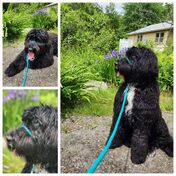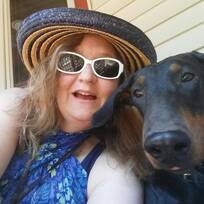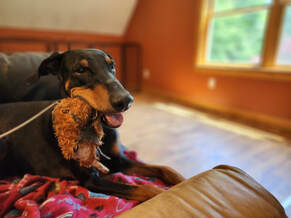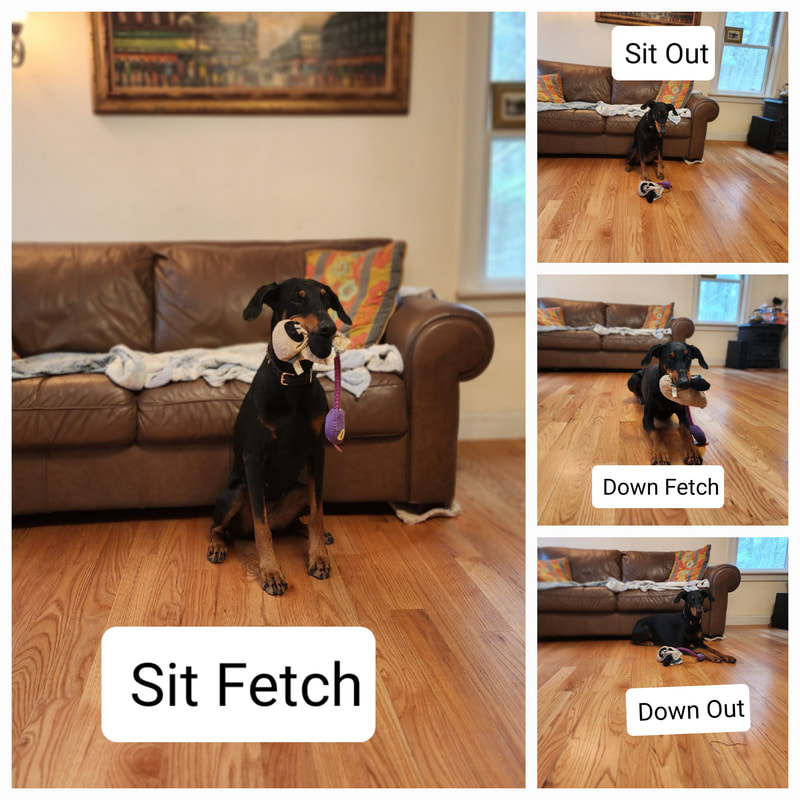 Poppy showing off the transitional leash (now called the side kick) which was invented by Heather Beck.
Poppy showing off the transitional leash (now called the side kick) which was invented by Heather Beck.
 Poppy showing off the transitional leash (now called the side kick) which was invented by Heather Beck. Poppy showing off the transitional leash (now called the side kick) which was invented by Heather Beck. There is a quote passed around by many professional dog trainers "What your dog can't do on leash, they can't do off leash". Leashes are very important pieces of dog training equipment, but they aren't talked about that much in pet dog training circles. They really deserve our respect, because leashes are a life line to a dog in training, who will be enjoying some off leash freedom some day beyond confined areas (fences, walls of a building, and so on).
 As I write this, the new training dogs coming in have been frequent now, and our business is heating back up for the summer. This is a really stressful time for Shana at home as always. Being a dog trainer's dog is not fun for all dogs. At the same time, we have been working regularly on Shana's impulse control and reactivity around other dogs. She has been doing really well, but today she has clearly had enough of this. We are currently in the Middle of Week 6 on a Thursday. I haven't taken many videos, so I am going to go over what we have been doing to date.  Our Shana with her "treasure" after a flirt pole training session of send to two places. After this, she fell into a deep sleep. Our Shana with her "treasure" after a flirt pole training session of send to two places. After this, she fell into a deep sleep. Why should someone consider adding play training to their dog training routine? I say add, because I am never just play training. For instance, if I am on a busy city street and we have some training to do, I probably am not going to use my flirt pole, frisbee, or ball to start a training session. I may use food as play or just as a standard reward. I may also use to do a subtle form of traditional training or management. So for those reasons, I don't believe you can get away with just play training your dog, although I would not have a problem with it if I could figure out how! So then the question is, why add play training in? How Do You Use Play Training for Impulse Control? What is Impulse Control? (Part 3 of 4 Series)6/7/2023  This is Shana demonstrating some impulse control while we play and food train. Sometimes I use just food reward or just toy reward. In this instance, I am using both food and toy. Shana's impulse is to rip the toy apart right before my eyes OR not give it up at all. Impulse control is when the dog is not doing something that they would like to do in the moment. When you are using play, they are controlling their impulse because they want the game to go on, instead of being corrected in more traditional training methods. Note: Our next blog will go over what play training provides for you that is different than traditional dog training, and why you might want to use it. |
Author, Robin RubinOwner and Head Dog Trainer in Maine, Robin Katherine Rubin, started her Maine dog training business in September 2004. Our dog training facility is located in Southern Maine in York Beach and we help families enjoy their dogs more, making sure they listen reliably and resolving unwanted behaviors. Archives
July 2024
Categories
All
|
 RSS Feed
RSS Feed